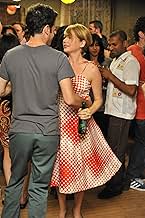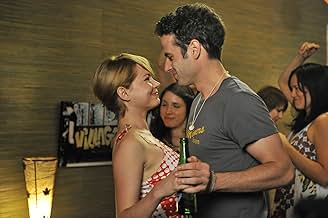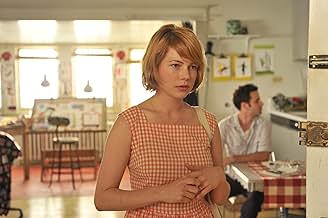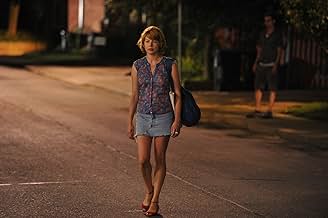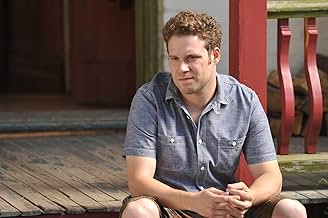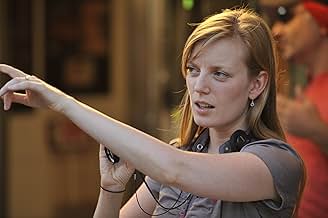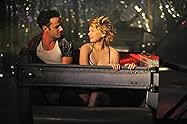A happily married woman falls for the artist who lives across the street.A happily married woman falls for the artist who lives across the street.A happily married woman falls for the artist who lives across the street.
- Awards
- 3 wins & 19 nominations total
Vanessa Carter
- Tony
- (as Vanessa Coelho)
Ciarán MacGillivray
- Soldier
- (as Ciaran MacGillivray)
- Director
- Writer
- All cast & crew
- Production, box office & more at IMDbPro
Featured reviews
Common terms associated with movies about infidelity would be "lust," "passion" and "betrayal," yet all those things are suspiciously absent from Sarah Polley's infidelity drama, "Take This Waltz." Her film is about as anti-soap opera as you can get — careful to avoid melodrama and dedicated to sidestepping any and all conventional depictions of adult relationships in film.
It seems odd to call Polley bold for showing it like it is, the way that she drags us through the head of her main character, Margot (Michelle Williams), who so undeniably loves her husband, Lou (Seth Rogen), yet cannot deny her feelings for Daniel (Luke Kirby), a man she meets while away for work who turns out to be her neighbor. However, when it comes to filmmaking, anything that deviates from Hollywood reality can make an audience uncomfortable, so it takes some guts to ignore that filmmaking impulse.
Consequently, a good chunk of viewers will be turned off or frustrated by "Take This Waltz," losing patience with the inaction of its characters and pulling their hair out over the tension oozing out of the most casual character interactions. Yes, "Take This Waltz" can be so uneventful that it verges on pointless, but in time Polley's intentions become very clear.
As Margot and Daniel get closer, they don't really get closer, and as Margot and Lou drift apart, they actually come off as in love as they've ever been. For much of the film, it's in Margot's head that the cheating is actually happening. Her thoughts and actions are not in sync and it becomes extremely difficult for us to find empathy for her because we feel as though she needs to act on her feelings, to either voice her displeasure to Lou or throw herself at Daniel. That's the Hollywood impulse calling.
Polley continues to resist, and as challenging as it becomes to watch at times, her film comes out better for sticking to its convictions. As she clearly intended, a switch flips in a scene in which Margot and Daniel ride an indoor Scrambler as "Video Killed the Radio Star" plays, an in the loopy chaos of the scene, we (and Margot) find a certain clarity in understanding what's going on between the main characters.
There's a definite phantasmagoria to Polley's style as well that while visually engaging contrasts a bit with what's otherwise such a nuanced, completely believable film. Several scenes play out like dream sequences, but we later can confirm they actually happened. She seems quite content to toy with our expectations and challenge what we think we know to be true about how love works.
You couldn't cast a better actress than Williams with a performance that's so hard to pull off. We only identify with Margot because we see her humanity, but it's tough to understand her and in some cases even like as a third-party observer of her story. Williams should be lauded for volunteering for this experiment and selling it as well as she does, especially when you consider that Kirby is a total unknown and Rogen is a poster child for modern comedy, for formulaic comedies that are such a far cry from "Take This Waltz."
The end of the movie is bound to bother a lot of people, while others will be intrigued at the choice and make peace with what Polley has to say because she frankly makes a good argument. Fidelity gets such a black-and-white portrayal in film and television, though maybe that's a societal thing because of its prominence in religious code. Nevertheless, she utilizes every tool at her disposal to present the gray area that we so quickly jump to deny and shudder to embrace.
It's tough to really enjoy a film that doesn't emotionally click, in which we don't feel with our hearts that things should've turned out how they did, but Polley has such a beautiful directorial style and conveys her intentions so clearly that "Take This Waltz" warrants a certain degree of respect for its bold yet so honest and impressively perceptive take on love.
~Steven C
Thanks for reading! Visit moviemusereviews.com for more!
It seems odd to call Polley bold for showing it like it is, the way that she drags us through the head of her main character, Margot (Michelle Williams), who so undeniably loves her husband, Lou (Seth Rogen), yet cannot deny her feelings for Daniel (Luke Kirby), a man she meets while away for work who turns out to be her neighbor. However, when it comes to filmmaking, anything that deviates from Hollywood reality can make an audience uncomfortable, so it takes some guts to ignore that filmmaking impulse.
Consequently, a good chunk of viewers will be turned off or frustrated by "Take This Waltz," losing patience with the inaction of its characters and pulling their hair out over the tension oozing out of the most casual character interactions. Yes, "Take This Waltz" can be so uneventful that it verges on pointless, but in time Polley's intentions become very clear.
As Margot and Daniel get closer, they don't really get closer, and as Margot and Lou drift apart, they actually come off as in love as they've ever been. For much of the film, it's in Margot's head that the cheating is actually happening. Her thoughts and actions are not in sync and it becomes extremely difficult for us to find empathy for her because we feel as though she needs to act on her feelings, to either voice her displeasure to Lou or throw herself at Daniel. That's the Hollywood impulse calling.
Polley continues to resist, and as challenging as it becomes to watch at times, her film comes out better for sticking to its convictions. As she clearly intended, a switch flips in a scene in which Margot and Daniel ride an indoor Scrambler as "Video Killed the Radio Star" plays, an in the loopy chaos of the scene, we (and Margot) find a certain clarity in understanding what's going on between the main characters.
There's a definite phantasmagoria to Polley's style as well that while visually engaging contrasts a bit with what's otherwise such a nuanced, completely believable film. Several scenes play out like dream sequences, but we later can confirm they actually happened. She seems quite content to toy with our expectations and challenge what we think we know to be true about how love works.
You couldn't cast a better actress than Williams with a performance that's so hard to pull off. We only identify with Margot because we see her humanity, but it's tough to understand her and in some cases even like as a third-party observer of her story. Williams should be lauded for volunteering for this experiment and selling it as well as she does, especially when you consider that Kirby is a total unknown and Rogen is a poster child for modern comedy, for formulaic comedies that are such a far cry from "Take This Waltz."
The end of the movie is bound to bother a lot of people, while others will be intrigued at the choice and make peace with what Polley has to say because she frankly makes a good argument. Fidelity gets such a black-and-white portrayal in film and television, though maybe that's a societal thing because of its prominence in religious code. Nevertheless, she utilizes every tool at her disposal to present the gray area that we so quickly jump to deny and shudder to embrace.
It's tough to really enjoy a film that doesn't emotionally click, in which we don't feel with our hearts that things should've turned out how they did, but Polley has such a beautiful directorial style and conveys her intentions so clearly that "Take This Waltz" warrants a certain degree of respect for its bold yet so honest and impressively perceptive take on love.
~Steven C
Thanks for reading! Visit moviemusereviews.com for more!
Sarah Polley proves her impressive directorial and screen writing debut, 2006's "Away from Her" starring a luminous, Oscar-nominated Julie Christie as an Alzheimer's patient, was no fluke with this incisive look at a most inchoate love triangle. With a title taken from Leonard Cohen's cultish song, this clear-eyed yet melancholic 2012 drama once again showcases Polley's prodigious acumen in capturing the complexity of adult relationships without casting blame or judgment on the parties involved. The focal point of the triangle is 28-year-old Margot, an aspiring writer from Toronto on an assignment in Nova Scotia to write the copy for a travel brochure on historic Louisbourg. There she meets Daniel, also from Toronto where he is a struggling artist and a rickshaw driver. An attraction is almost immediate but not consummated. When they fly home on the same plane, Margot discovers he lives just across the street from her, which complicates matters since she's been married for five years to Lou, a cookbook author specializing in chicken dishes. Their marriage is comfortable, and their interactions reflect a lived-in familiarity marked by cute practical jokes and quirky riffs of humor.
But what Margot sees in Daniel is something that's been missing in her life, a sexual spark that excites her, even though she dares not act upon it since she really does love Lou in spite of his foibles - including a certain apathy about their relationship that he thinks is perfectly normal. She could see spending the rest of her life with Lou, but she wonders if he is her soul-mate or whether it's worth the risk to find out if Daniel is really the one. Blinded by desires she had yet to tap in her marriage, Margot knows if she acts upon those feelings, there will come some point where she'll have to make a hard decision between Lou and Daniel. Michelle Williams captures Margot's inner conflict with palpable empathy as you see her character expose her thoughts in moments of quiet in which she is the harshest judge of her actions. It's a shining performance which compares favorably to her evocative Marilyn Monroe in "My Week with Marilyn". There is a deliberate vagueness to the two men. As Daniel, Luke Kirby ("Mambo Italiano") manages to convey the lure of "the other man" without coming across as despicable even though it's clear he wants her from afar. At the same time, it's clear that Margot and Daniel have little in common, and they make you wonder how sustainable their relationship could be.
Seth Rogen does something surprising in this film – he acts. He still doesn't stray that far away from his shaggy-dog comic persona, but he realistically shows how Lou's contentment and impassivity bring Margot both lasting security and unresolvable fear and longing. Similarly, Sarah Silverman makes her few scenes count as Lou's plainspoken sister Geraldine, who is married with two kids and an alcoholic just out of rehab, especially when she tells Margot what she thinks of her ultimate decision. That Polley can coax such fine dramatic work from Rogen and Silverman is a credit to her growing confidence as a filmmaker. As a native Canadian, she also presents Toronto as a setting with its own unique identity (versus other directors who use it as a double for New York or Chicago), and her cinematographer Luc Montpellier brings a lushness to the images that adds to the intoxication Margot is feeling. There are still flaws – the ramshackle pace adds to an already lengthy 116-minute running time, and the climactic time-lapse montage feels out- of-place for a film that had tread so lightly before. Regardless, this film should play on a double bill with David Lean's "Brief Encounter" to show how mores have evolved about infidelity over seventy years. Whatever the outcome may be, the bottom line is that there are no easy answers.
But what Margot sees in Daniel is something that's been missing in her life, a sexual spark that excites her, even though she dares not act upon it since she really does love Lou in spite of his foibles - including a certain apathy about their relationship that he thinks is perfectly normal. She could see spending the rest of her life with Lou, but she wonders if he is her soul-mate or whether it's worth the risk to find out if Daniel is really the one. Blinded by desires she had yet to tap in her marriage, Margot knows if she acts upon those feelings, there will come some point where she'll have to make a hard decision between Lou and Daniel. Michelle Williams captures Margot's inner conflict with palpable empathy as you see her character expose her thoughts in moments of quiet in which she is the harshest judge of her actions. It's a shining performance which compares favorably to her evocative Marilyn Monroe in "My Week with Marilyn". There is a deliberate vagueness to the two men. As Daniel, Luke Kirby ("Mambo Italiano") manages to convey the lure of "the other man" without coming across as despicable even though it's clear he wants her from afar. At the same time, it's clear that Margot and Daniel have little in common, and they make you wonder how sustainable their relationship could be.
Seth Rogen does something surprising in this film – he acts. He still doesn't stray that far away from his shaggy-dog comic persona, but he realistically shows how Lou's contentment and impassivity bring Margot both lasting security and unresolvable fear and longing. Similarly, Sarah Silverman makes her few scenes count as Lou's plainspoken sister Geraldine, who is married with two kids and an alcoholic just out of rehab, especially when she tells Margot what she thinks of her ultimate decision. That Polley can coax such fine dramatic work from Rogen and Silverman is a credit to her growing confidence as a filmmaker. As a native Canadian, she also presents Toronto as a setting with its own unique identity (versus other directors who use it as a double for New York or Chicago), and her cinematographer Luc Montpellier brings a lushness to the images that adds to the intoxication Margot is feeling. There are still flaws – the ramshackle pace adds to an already lengthy 116-minute running time, and the climactic time-lapse montage feels out- of-place for a film that had tread so lightly before. Regardless, this film should play on a double bill with David Lean's "Brief Encounter" to show how mores have evolved about infidelity over seventy years. Whatever the outcome may be, the bottom line is that there are no easy answers.
'I'm afraid of being in-between of things.' That's a beautiful line quoted by Margo from a film called 'Take this waltz'. Attracted by the title which reminded me of Leonard Cohen's song which turned out to be the same source at the first place, also the cast especially Michelle Williams that I find quite special, special in a way that her appearance seems to be fragrant because of how she looks like. I somehow believed that the character resembles a lot with her in real life. We all know her divorced co-star husband Heath Ledger died of an overdose accident, and they have a daughter named Mathilda. After his death she somehow emerges into a characterized actress. You can see her playing depressed wife, Marilyn Monroe, and this confused in-house freelance writer not knowing what to write about. It's all very well chosen with her characters. When I see the way she read out the lines, in a naturally performed way, there's a kind of magic and it must be coming from all what she experienced. Of course every actor's acting style comes from their own life and experience. Yet Michelle has this very sincere attitude of not disguising what went through in her spiritually and physically. Her nudity is not difficult to be found. Although a mother to daughter, her figure remains like a maid, pure and simple. It seems like having a child brings her nothing but growth, growth of innocence and courage of showing the real self inside of her.
The film involves a freelance writer Margo who married to a cookbook author and they enjoyed leisure house life on a Portugal region in Toronto, Canada. The couple is happily engaged with their friends and natives. Parties are thrown every now and then. They sometimes argue, but generally leading a sweet and contented marriage till she encounters with a handsome guy at a tourism site. The magic connection drew on these two strangers. They both found each other very strangely familiar. And right at the first conversation they felt natural enough to joke each other and explain one's inner feelings. Together they make a couple of innocent child embarking on an intuitive sight of the world sparkling only in their eyes. It's fun and haunting, especially when it's found they're only neighbors across from street.
Yet the thrill of encounter only keeps in a very cautious way, which makes it all the more alluring. They interact in an extremely explicit and intimate verbal way to displace physical attraction. Imaginary stroking, kissing and intercourse touched their mind with fulfilled excitement. Every morning she followed him or vice versa to the beach, cafés and the swimming pool, where they swim like dolphins, getting near and dodging away. When he attempted to grab her ankle, the moment suddenly halted and she just left like that. She felt like the spell will be broken once the intimacy takes off to a further step. And she's still guarding herself from the fear of casting herself in the craziness of love affair.
The film involves a freelance writer Margo who married to a cookbook author and they enjoyed leisure house life on a Portugal region in Toronto, Canada. The couple is happily engaged with their friends and natives. Parties are thrown every now and then. They sometimes argue, but generally leading a sweet and contented marriage till she encounters with a handsome guy at a tourism site. The magic connection drew on these two strangers. They both found each other very strangely familiar. And right at the first conversation they felt natural enough to joke each other and explain one's inner feelings. Together they make a couple of innocent child embarking on an intuitive sight of the world sparkling only in their eyes. It's fun and haunting, especially when it's found they're only neighbors across from street.
Yet the thrill of encounter only keeps in a very cautious way, which makes it all the more alluring. They interact in an extremely explicit and intimate verbal way to displace physical attraction. Imaginary stroking, kissing and intercourse touched their mind with fulfilled excitement. Every morning she followed him or vice versa to the beach, cafés and the swimming pool, where they swim like dolphins, getting near and dodging away. When he attempted to grab her ankle, the moment suddenly halted and she just left like that. She felt like the spell will be broken once the intimacy takes off to a further step. And she's still guarding herself from the fear of casting herself in the craziness of love affair.
OK it's not as bad as all that -- it is sort-of OK -- but I had to say it. I'm probably not the first.
This is basically a short film on infidelity, dragged out to a couple of hours. It's not terrible, but it's also not good.
The film has its good points, of course. I found the cinematography to be great, for example. Particularly the shots in and around water were very effective, and showcase the use of film to communicate without words. But the fact that I'm noticing the cinematography first tells you that the story isn't really there.
I thought the acting was believable. Everyone performed well in their roles, as far as I can tell. Seth, Luke, and Michelle were good choices for the triangle. That said, I am confused about casting not just one but two popular comedians against type. It made me question what I was supposed to be seeing. I'm not sure I figured it out.
For me I attribute the problems to editing and writing.
The story didn't provide anyone for me to root for, identify with, or even hate. I didn't really care for any of the characters. I like these actors, but I found these characters annoying to varying degrees, but not so annoying as to be detestable. I just didn't wish to spend any more time with any of them than I had to. Perhaps if I could recognize in them any motivation for their actions (or lack thereof) it might be different. I compare this with The Postman Always Rings Twice, where understandable things happen, and lead to a more satisfying (but too preachy-perfect) ending.
The long silences here are not deep and meaningful. They're just long. I figure the film could be cut by half an hour, and not lose much beyond silence or small talk. In fact, even the end could be lopped off. There were several points where I thought it was over, but it kept going. What's odd is that there are some scenes where random half-second cuts are made, music-video-style, but real cuts to speed it along aren't made. I'm certain you could cut another hour or so and turn it into a really great short. There's nothing wrong with that, if telling the story with emotion is the goal.
The tie-in to Leonard Cohen's song seemed forced. I cringed. When I think about that scene, it feels to me like someone decided we needed a cryptic song by a Canadian poet to name the film after. I don't feel that any of the characters in the film are devoted Leonard Cohen fans.
Overall, I wouldn't recommend this film, but neither would I say to avoid it. It will surely be on the The Movie Network (among others) in Canada, since they apparently helped pay for it. The best place to see it is therefore probably cable or satellite.
This is basically a short film on infidelity, dragged out to a couple of hours. It's not terrible, but it's also not good.
The film has its good points, of course. I found the cinematography to be great, for example. Particularly the shots in and around water were very effective, and showcase the use of film to communicate without words. But the fact that I'm noticing the cinematography first tells you that the story isn't really there.
I thought the acting was believable. Everyone performed well in their roles, as far as I can tell. Seth, Luke, and Michelle were good choices for the triangle. That said, I am confused about casting not just one but two popular comedians against type. It made me question what I was supposed to be seeing. I'm not sure I figured it out.
For me I attribute the problems to editing and writing.
The story didn't provide anyone for me to root for, identify with, or even hate. I didn't really care for any of the characters. I like these actors, but I found these characters annoying to varying degrees, but not so annoying as to be detestable. I just didn't wish to spend any more time with any of them than I had to. Perhaps if I could recognize in them any motivation for their actions (or lack thereof) it might be different. I compare this with The Postman Always Rings Twice, where understandable things happen, and lead to a more satisfying (but too preachy-perfect) ending.
The long silences here are not deep and meaningful. They're just long. I figure the film could be cut by half an hour, and not lose much beyond silence or small talk. In fact, even the end could be lopped off. There were several points where I thought it was over, but it kept going. What's odd is that there are some scenes where random half-second cuts are made, music-video-style, but real cuts to speed it along aren't made. I'm certain you could cut another hour or so and turn it into a really great short. There's nothing wrong with that, if telling the story with emotion is the goal.
The tie-in to Leonard Cohen's song seemed forced. I cringed. When I think about that scene, it feels to me like someone decided we needed a cryptic song by a Canadian poet to name the film after. I don't feel that any of the characters in the film are devoted Leonard Cohen fans.
Overall, I wouldn't recommend this film, but neither would I say to avoid it. It will surely be on the The Movie Network (among others) in Canada, since they apparently helped pay for it. The best place to see it is therefore probably cable or satellite.
Margot (Michelle Williams) meets Daniel (Luke Kirby) on a plane ride home. They hit it off and then they realize that they are actually neighbors. She finds him intriguing and rethinks her bland marriage to Lou (Seth Rogen). Sarah Silverman plays Margot's friend Geraldine.
Writer/director Sarah Polley is trying to dive into the emotions of cheating. And it feels manufactured. There is something artificial about the attraction between Margot and Daniel. There is just not enough chemistry between the two. Seth Rogen puts in a nice piece of work. It helps that he has the most compelling scene in the movie. (water in the shower, I'll say no more) Michelle Williams has done this character before, and she does it well. She's the magnificent beauty who doesn't know herself. I have to put this down as a minor sophomore jinx for Sarah Polley after 'Away from Her'. Not too bad but I expect bigger and better things to come.
Writer/director Sarah Polley is trying to dive into the emotions of cheating. And it feels manufactured. There is something artificial about the attraction between Margot and Daniel. There is just not enough chemistry between the two. Seth Rogen puts in a nice piece of work. It helps that he has the most compelling scene in the movie. (water in the shower, I'll say no more) Michelle Williams has done this character before, and she does it well. She's the magnificent beauty who doesn't know herself. I have to put this down as a minor sophomore jinx for Sarah Polley after 'Away from Her'. Not too bad but I expect bigger and better things to come.
Did you know
- TriviaSarah Polley wrote the role of Lou for Seth Rogen.
- GoofsIn the beginning of the film a day passes by showing the relative movement of the sun - the light moving on the walls. The sun moves from west to east.
- ConnectionsFeatured in Great MoVie Mistakes (2013)
- SoundtracksGreen Mountain State
Written & Performed by Corinna Rose & The Rusty Horse Band
Used by permission of Corinna Rose & The Rusty Horse Band (SOCAN)
Details
- Release date
- Countries of origin
- Official sites
- Language
- Also known as
- Triste canción de amor
- Filming locations
- Louisbourg, Nova Scotia, Canada(lighthouse)
- Production companies
- See more company credits at IMDbPro
Box office
- Gross US & Canada
- $1,239,692
- Opening weekend US & Canada
- $137,019
- Jul 1, 2012
- Gross worldwide
- $4,965,950
- Runtime1 hour 56 minutes
- Color
- Sound mix
- Aspect ratio
- 1.85 : 1
Contribute to this page
Suggest an edit or add missing content








